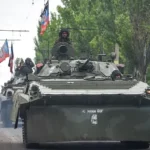Several European countries have thwarted threats against civilian targets in general and the Jewish community in particular in recent months.

Europe is facing an increase in terrorist plots, with some suspects posing as refugees and as the conflict between Israel and Hamas galvanizes new actors, according to authorities from various European countries.
Several European countries have thwarted threats against civilian targets in general and the Jewish community in particular in recent months.
In Austria and Bosnia, security forces arrested several groups of armed Afghan and Syrian refugees last December, the Wall Street Journal reported on Tuesday. These individuals, found with weapons and ammunition, including Kalashnikov assault rifles, appeared to be targeting Jewish and Israeli objectives in Europe, heightening alarm about internal security risks.
Late last year, a group of Tajik citizens were also arrested after being discovered planning attacks on the Cologne Cathedral (Germany) and St. Stephen’s Cathedral (Vienna) at Christmas. Both churches attract hundreds of visitors during the holiday season.
This increase in terrorist activity has not only mobilized law enforcement in Austria and Bosnia but also in Germany, Italy, and Sweden.
Significant operations have been carried out in both Germany and Italy, with the arrest of individuals linked to Hamas and the Al-Aqsa Martyrs’ Brigades, both designated as terrorist groups by the European Union and the United States. In Italy, specifically, three Palestinians were arrested while planning attacks, including suicide bombings, on civilian and military targets on the continent.
In another case, involving Sweden, where Iran deployed two undercover agents as a refugee couple, a more sophisticated tactic is revealed.
These agents, who were granted asylum two years after arriving in the country, plotted the assassination of Swedish Jewish leaders. Authorities believe the couple were sleeper agents of the Islamic Revolutionary Guard Corps, an Iranian military group designated as a terrorist organization in the United States, and were tasked with the assassinations in 2021.
“The people they targeted are seen as representing institutions related to what they consider the enemy state, Israel, even though we were just Jews living in Sweden,” Saskia Pantell, former director of the Zionist Federation and one of the terrorists’ targets, told the WSJ.
In another case linked to the Persian regime, a German court sentenced a German-Iranian man to nearly three years in prison in December for attempting to place a firebomb at a synagogue in the city of Bochum on behalf of the Iranian government in November 2022.
The role of refugees in these terrorist plots has raised concerns about how extremist groups might be exploiting the migrant crisis to infiltrate Europe. This methodology not only recalls the tragedy of the 2015 Paris attacks, perpetrated in part by terrorists who entered Europe disguised as asylum seekers but also raises questions about Europe’s ability to protect its borders without compromising its humanitarian commitment.
Moreover, according to researchers cited by the Wall Street Journal, the various incidents suggest that the terrorist threat in Europe is not only growing but also coming from new sources, complicating the work of security agencies.
The wave of attacks that ravaged the continent from 2015 onwards was largely inspired, and in part directed, by the Islamic State, the Sunni terrorist militia from Syria and Iraq. Now the threat comes not only from the Islamic State Khorasan (also known as ISIS-K), the successor organization of the Islamic State based in Afghanistan, but also from Iran and its proxies in the Middle East, including Hezbollah and Hamas.
Late last year, German police launched raids across the country against Hamas and its affiliates. German and Dutch investigators also arrested four people for allegedly receiving orders from Hamas to open a secret stash of weapons and attack Jewish targets in Berlin and other places in Western Europe.
German prosecutors stated that Hamas had buried the weapons underground in Europe years ago, but the suspects, all former Hamas members involved in the group’s operations abroad, did not reveal where.
The alert also extends to the financing of these organizations, with evidence of an increase in contributions to groups like Hamas and Hezbollah from European territory, especially after the Hamas attack on Israel on October 7. This flow of funds, along with vigorous online campaigning and organizing protests, has allowed these groups not only to survive but to thrive, deploying new strategies to target objectives in Europe.
Pantell, who has moved to Israel since becoming a target of Iranian terrorists in Sweden, said Europe has experienced an explosion of antisemitism since October 7.
“We live here with constant air raid alerts,” she said, “but we’re not going back to Sweden because in Israel we feel safer even in an air raid shelter”.







